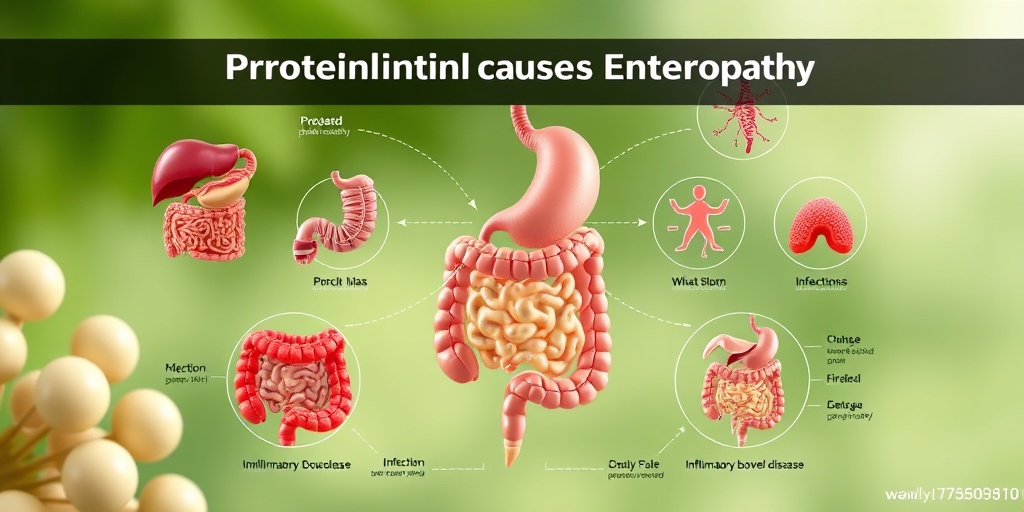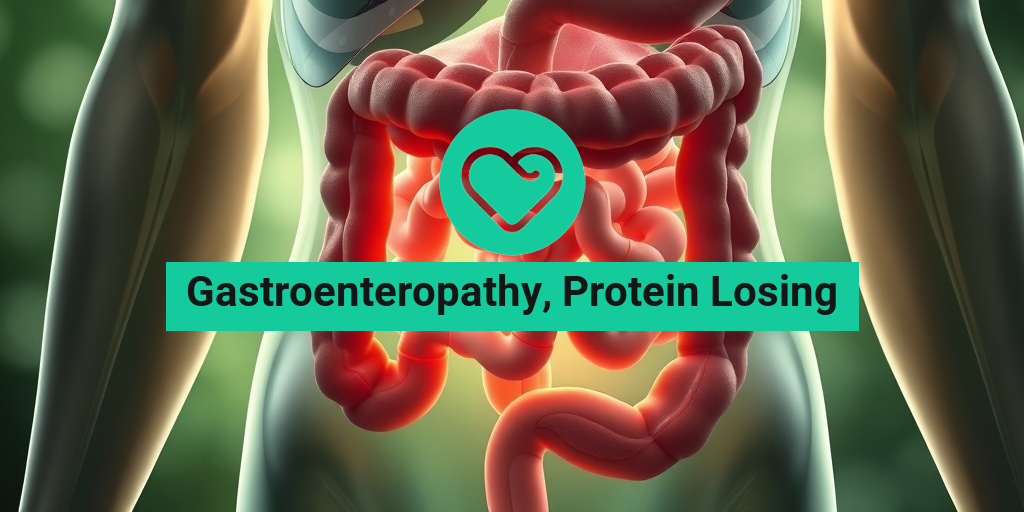What Is Gastroenteropathy?
Gastroenteropathy is a term that refers to any disease or disorder affecting the gastrointestinal (GI) tract. This broad category encompasses a variety of conditions that can impact the stomach, intestines, and other digestive organs. The symptoms can range from mild discomfort to severe complications, depending on the underlying cause.
Understanding the Gastrointestinal Tract
The gastrointestinal tract is a complex system responsible for digesting food, absorbing nutrients, and eliminating waste. It includes the mouth, esophagus, stomach, small intestine, large intestine, and anus. When any part of this system is compromised, it can lead to gastroenteropathy.
Common Symptoms of Gastroenteropathy
Symptoms of gastroenteropathy can vary widely but often include:
- Abdominal pain
- Diarrhea
- Nausea and vomiting
- Weight loss
- Fatigue
If you experience persistent symptoms, it’s essential to consult a healthcare professional for a proper diagnosis and treatment plan. Early intervention can prevent complications and improve quality of life.
Protein Losing Enteropathy Explained
One specific type of gastroenteropathy is protein losing enteropathy (PLE). This condition occurs when the intestines lose an excessive amount of protein, leading to a deficiency that can have serious health implications.
What Causes Protein Losing Enteropathy?
There are several potential causes of protein losing enteropathy, including:
- Inflammatory bowel disease (IBD): Conditions like Crohn’s disease and ulcerative colitis can damage the intestinal lining, leading to protein loss.
- Infections: Certain infections, particularly parasitic or bacterial, can disrupt the intestinal barrier.
- Intestinal lymphangiectasia: This rare condition affects the lymphatic system in the intestines, causing protein leakage.
- Neoplasia: Tumors in the GI tract can also lead to protein loss.
Symptoms of Protein Losing Enteropathy
Individuals with protein losing enteropathy may experience a range of symptoms, including:
- Swelling (edema): Due to low protein levels, fluid can accumulate in tissues.
- Diarrhea: Frequent, watery stools are common.
- Weight loss: As protein levels drop, muscle mass may decrease.
- Fatigue: A lack of protein can lead to overall weakness and tiredness.
Diagnosis and Treatment
Diagnosing protein losing enteropathy typically involves a combination of medical history, physical examination, and diagnostic tests such as:
- Blood tests: To check protein levels and assess overall health.
- Stool tests: To measure protein loss in the stool.
- Imaging studies: Such as ultrasounds or CT scans to visualize the intestines.
Treatment for protein losing enteropathy focuses on addressing the underlying cause. This may include:
- Medications: To reduce inflammation or treat infections.
- Dietary changes: Increasing protein intake and managing other dietary factors.
- Supplements: To help restore protein levels in the body.
For those seeking more information on managing gastroenteropathy and related conditions, Yesil Health AI (yesilhealth.com) offers evidence-based health answers that can guide you in making informed decisions about your health.
In conclusion, understanding gastroenteropathy and its specific forms, such as protein losing enteropathy, is crucial for effective management and treatment. If you or someone you know is experiencing symptoms, don’t hesitate to seek medical advice. Early diagnosis and intervention can make a significant difference in health outcomes. 🌟

Gastroenteropathy Symptoms
Gastroenteropathy, particularly protein losing gastroenteropathy, can manifest through a variety of symptoms that may vary in severity. Recognizing these symptoms early is crucial for effective management and treatment. Here are some common signs to watch for:
1. Chronic Diarrhea
One of the most prevalent symptoms of gastroenteropathy is chronic diarrhea. This can be watery or loose and may occur multiple times a day. The persistent nature of this symptom can lead to dehydration and electrolyte imbalances, making it essential to seek medical advice if it lasts more than a few days.
2. Weight Loss
Unexplained weight loss is another significant symptom. As the body loses protein through the gastrointestinal tract, it can lead to a decrease in muscle mass and overall body weight. This weight loss can be alarming and should prompt further investigation.
3. Abdominal Pain and Discomfort
Individuals with gastroenteropathy often experience abdominal pain or discomfort. This can range from mild cramping to severe pain, depending on the underlying cause of the condition. The pain may be accompanied by bloating or gas, further complicating the symptoms.
4. Swelling and Edema
Due to the loss of protein, patients may develop swelling or edema, particularly in the legs, abdomen, or face. This occurs because proteins help maintain fluid balance in the body, and their deficiency can lead to fluid accumulation in tissues.
5. Fatigue and Weakness
As the body struggles to absorb nutrients and maintain protein levels, individuals may feel an overwhelming sense of fatigue and weakness. This can significantly impact daily activities and overall quality of life.
6. Nutritional Deficiencies
Since gastroenteropathy affects nutrient absorption, patients may experience symptoms related to nutritional deficiencies. This can include anemia, vitamin deficiencies, and other health issues stemming from inadequate nutrient intake.
Causes of Protein Losing Enteropathy
Understanding the causes of protein losing enteropathy is essential for effective treatment and management. This condition can arise from various underlying issues, each requiring specific attention. Here are some of the primary causes:
1. Inflammatory Bowel Disease (IBD)
IBD, which includes conditions like Crohn’s disease and ulcerative colitis, is a leading cause of protein losing gastroenteropathy. Inflammation in the intestines can disrupt normal protein absorption, leading to significant protein loss.
2. Intestinal Lymphangiectasia
This rare condition involves the dilation of lymphatic vessels in the intestines, which can lead to protein loss. It often results in malabsorption and can be associated with other diseases, making it a complex issue to manage.
3. Infectious Diseases
Certain infections, such as those caused by parasites or bacteria, can damage the intestinal lining and lead to protein losing gastroenteropathy. These infections can cause inflammation and disrupt the absorption of nutrients.
4. Neoplasia
In some cases, tumors in the gastrointestinal tract can lead to protein loss. Neoplasia can cause obstruction or inflammation, further complicating nutrient absorption and leading to protein losing conditions.
5. Celiac Disease
Celiac disease is an autoimmune disorder triggered by gluten, leading to damage in the small intestine. This damage can result in malabsorption and protein loss, making it a significant cause of gastroenteropathy.
6. Other Conditions
Other factors, such as chronic pancreatitis, liver disease, and certain medications, can also contribute to protein losing gastroenteropathy. Each of these conditions can affect the digestive system’s ability to absorb nutrients effectively.
Recognizing the symptoms and understanding the causes of gastroenteropathy is vital for timely diagnosis and treatment. If you or someone you know is experiencing these symptoms, it is essential to consult a healthcare professional for a thorough evaluation and appropriate management. 🩺

Risk Factors for Gastroenteropathy
Gastroenteropathy, particularly protein losing gastroenteropathy, is a condition that can significantly impact an individual’s health. Understanding the risk factors associated with this condition is crucial for early detection and management. Here are some of the primary risk factors:
Genetic Predisposition
Some individuals may have a genetic predisposition to gastrointestinal disorders. Family history can play a significant role in the likelihood of developing protein losing gastroenteropathy. If you have relatives with similar conditions, it’s essential to be vigilant about your gastrointestinal health.
Underlying Health Conditions
Certain health conditions can increase the risk of developing gastroenteropathy. These include:
- Inflammatory Bowel Disease (IBD): Conditions like Crohn’s disease and ulcerative colitis can lead to protein loss.
- Heart Disease: Congestive heart failure can affect blood flow to the intestines, leading to protein loss.
- Kidney Disease: Impaired kidney function can result in protein loss through urine.
Dietary Factors
Your diet can also influence the risk of developing gastroenteropathy. A diet low in essential nutrients or high in processed foods may contribute to gastrointestinal issues. Additionally, food intolerances or allergies can lead to inflammation and protein loss.
Age and Gender
Age and gender can also be significant risk factors. Older adults are generally at a higher risk due to the natural decline in gut function. Moreover, some studies suggest that men may be more susceptible to certain types of gastroenteropathy compared to women.
Environmental Factors
Exposure to certain environmental factors, such as toxins or infections, can increase the risk of developing gastroenteropathy. For instance, parasitic infections can lead to inflammation and protein loss in the intestines.
Diagnosis of Protein Losing Conditions
Diagnosing protein losing gastroenteropathy involves a comprehensive approach, as the symptoms can often mimic other gastrointestinal disorders. Here’s how healthcare professionals typically diagnose this condition:
Medical History and Symptoms Review
The first step in diagnosis is a thorough review of the patient’s medical history and symptoms. Common symptoms of protein losing gastroenteropathy include:
- Chronic diarrhea
- Weight loss
- Edema (swelling due to fluid retention)
- Fatigue
Patients are encouraged to provide detailed information about their symptoms, dietary habits, and any underlying health conditions.
Physical Examination
A physical examination is crucial in identifying signs of protein loss, such as swelling in the abdomen or legs. The healthcare provider may also check for signs of malnutrition or dehydration.
Laboratory Tests
Laboratory tests play a vital role in diagnosing protein losing conditions. These may include:
- Blood Tests: To measure protein levels, liver function, and kidney function.
- Stool Tests: To check for protein in the stool, which can indicate protein loss.
- Imaging Studies: Techniques like ultrasound or CT scans may be used to visualize the gastrointestinal tract and identify any abnormalities.
Endoscopy
In some cases, an endoscopy may be necessary to directly visualize the intestines. This procedure allows doctors to take biopsies and assess the condition of the intestinal lining, helping to identify any underlying causes of protein loss.
Consultation with Specialists
Depending on the findings, a referral to a gastroenterologist may be required for further evaluation and management. Specialists can provide targeted treatment options based on the specific cause of the protein losing gastroenteropathy.
Understanding the risk factors and diagnostic processes for gastroenteropathy, protein losing conditions is essential for effective management and treatment. Early detection can lead to better outcomes and improved quality of life. 🌟

Treatment Options for Gastroenteropathy
Gastroenteropathy, particularly protein losing gastroenteropathy, is a condition that can significantly impact an individual’s health. It involves the loss of protein from the gastrointestinal tract, leading to various symptoms and complications. Understanding the treatment options available is crucial for effective management. Here, we explore several approaches to treating this condition.
1. Dietary Modifications
One of the first steps in managing protein losing gastroenteropathy is making dietary changes. A well-balanced diet that is rich in protein can help compensate for the protein loss. Here are some dietary strategies:
- High-Protein Foods: Incorporate lean meats, fish, eggs, dairy products, and legumes into your meals.
- Low-Fiber Options: In some cases, a low-fiber diet may be recommended to reduce gastrointestinal irritation.
- Frequent Small Meals: Eating smaller, more frequent meals can help improve nutrient absorption.
2. Medications
Depending on the underlying cause of gastroenteropathy, various medications may be prescribed:
- Anti-inflammatory Drugs: These can help reduce inflammation in the gastrointestinal tract.
- Immunosuppressants: If the condition is autoimmune in nature, these medications may be necessary.
- Antibiotics: If an infection is present, antibiotics may be used to treat it.
3. Nutritional Supplements
For individuals struggling to meet their protein needs through diet alone, nutritional supplements can be beneficial. Options include:
- Protein Powders: These can be added to smoothies or meals to boost protein intake.
- Liquid Nutritional Supplements: These provide a concentrated source of calories and nutrients.
4. Addressing Underlying Conditions
It’s essential to identify and treat any underlying conditions contributing to protein losing gastroenteropathy. This may involve:
- Endoscopic Procedures: To diagnose and treat issues within the gastrointestinal tract.
- Management of Chronic Diseases: Conditions like Crohn’s disease or celiac disease may require specific treatments.
5. Regular Monitoring
Regular follow-ups with healthcare providers are crucial for monitoring the condition and adjusting treatment as necessary. Blood tests can help track protein levels and overall health.
Managing Gastroenteropathy at Home
Living with gastroenteropathy can be challenging, but there are several strategies you can implement at home to manage symptoms effectively. Here are some practical tips:
1. Keep a Food Diary
Tracking what you eat can help identify foods that trigger symptoms. Note any reactions to specific foods and discuss these with your healthcare provider to tailor your diet accordingly.
2. Stay Hydrated
Dehydration can be a concern, especially if diarrhea is present. Ensure you drink plenty of fluids, and consider electrolyte solutions if necessary. Staying hydrated helps maintain overall health and supports digestion.
3. Stress Management
Stress can exacerbate gastrointestinal symptoms. Incorporating stress-reducing techniques such as:
- Meditation: Helps calm the mind and reduce anxiety.
- Yoga: Gentle movements can aid digestion and promote relaxation.
- Deep Breathing Exercises: Simple techniques can help manage stress levels.
4. Regular Exercise
Engaging in regular physical activity can improve digestion and overall well-being. Aim for moderate exercise, such as walking or swimming, which can be beneficial without putting too much strain on the body.
5. Support Networks
Connecting with others who have similar experiences can provide emotional support and practical advice. Consider joining support groups or online forums focused on protein losing gastroenteropathy.
By implementing these strategies, individuals can take an active role in managing their condition and improving their quality of life. Remember, always consult with a healthcare professional before making significant changes to your treatment plan or lifestyle. 🌟

Frequently Asked Questions about Gastroenteropathy, Protein Losing
What is Gastroenteropathy, Protein Losing?
Gastroenteropathy, Protein Losing refers to a condition where the gastrointestinal tract loses an excessive amount of protein, leading to various health issues. This can result from several underlying causes, including inflammation, infections, or other gastrointestinal disorders.
What are the symptoms of Protein Losing Gastroenteropathy?
Common symptoms of protein losing gastroenteropathy include:
- Swelling or edema, particularly in the legs and abdomen
- Diarrhea or loose stools
- Weight loss
- Fatigue and weakness
- Abdominal pain or discomfort
What causes Protein Losing Gastroenteropathy?
There are several potential causes of protein losing gastroenteropathy, including:
- Inflammatory bowel disease (IBD)
- Infections, such as parasites or bacterial overgrowth
- Food allergies or intolerances
- Certain cancers affecting the gastrointestinal tract
- Congestive heart failure or liver disease
How is Protein Losing Gastroenteropathy diagnosed?
Diagnosis typically involves a combination of:
- Medical history and physical examination
- Blood tests to check protein levels
- Stool tests to assess protein loss
- Imaging studies, such as ultrasound or CT scans
- Endoscopy for direct examination of the gastrointestinal tract
Can Protein Losing Gastroenteropathy be treated?
Treatment for protein losing gastroenteropathy focuses on addressing the underlying cause. This may include:
- Medications to reduce inflammation
- Dietary changes to manage symptoms
- Supplements to replace lost proteins
- In severe cases, surgical intervention may be necessary
Is Protein Losing Gastroenteropathy common in dogs?
Yes, protein losing gastroenteropathy in dogs is a recognized condition. Symptoms in dogs may include vomiting, diarrhea, and weight loss. If you suspect your pet is affected, consult a veterinarian for proper diagnosis and treatment.
Why does my protein keep dropping?
A persistent drop in protein levels can be indicative of various health issues, including protein losing conditions like gastroenteropathy. It’s essential to seek medical advice to determine the underlying cause and appropriate treatment.
What lifestyle changes can help manage Gastroenteropathy?
To manage gastroenteropathy, consider the following lifestyle changes:
- Adopting a balanced diet rich in nutrients
- Avoiding trigger foods that may exacerbate symptoms
- Staying hydrated
- Regular check-ups with your healthcare provider
When should I see a doctor?
If you experience symptoms such as persistent diarrhea, significant weight loss, or swelling, it is crucial to consult a healthcare professional. Early diagnosis and treatment can significantly improve outcomes for those with gastroenteropathy, protein losing.




